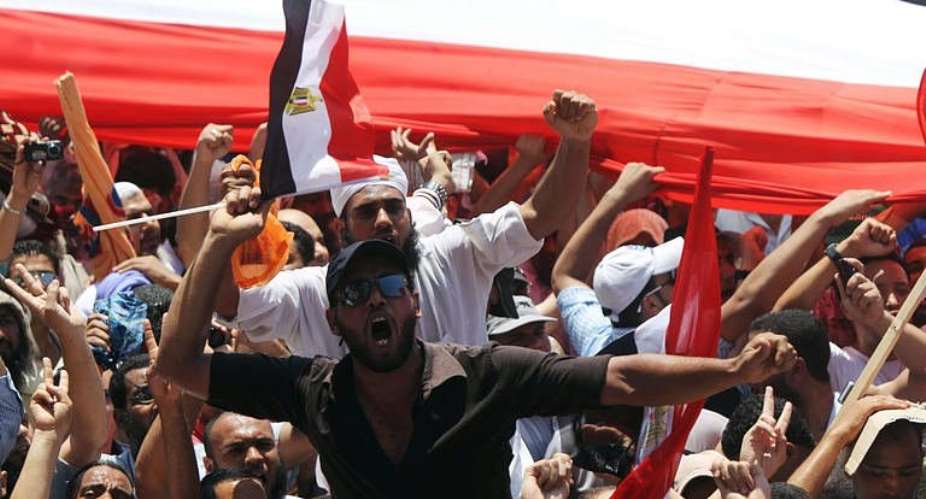CAIRO (AFP) - Hundreds of thousands of Islamists packed Cairo's Tahrir Square on Friday in a show of force that irked secularists as at least two people died in clashes in the Sinai between police and apparent Islamists.
Islamists from across the country flocked into the central square to defend what they called "Egypt's Islamic identity" in Egypt's largest protest since a revolt ousted president Hosni Mubarak in February.
Smaller rallies took place elsewhere across the country.
In the northern Sinai town of El-Arish, a peaceful protest earlier gave way to armed clashes between masked men carrying Islamist banners and police.
Around 150 men in trucks and on motorbikes fired assault rifles into the air, forcing terrified residents into their homes, witnesses told AFP.
Waving black flags which read "There is no God but Allah," the gunmen stormed through the city and tried to force their way into a police station but were confronted by policemen and soldiers.
At least two civilians, one of them a 13-year-old boy, were killed in that incident, which set off a gunfight, the official MENA news agency reported.
Twelve police conscripts were wounded, a health ministry official told state television.
Witnesses said the armed men had also tried to destroy a statue of the late president Anwar Sadat, whom Islamists assassinated in 1981.
The rally in Cairo, organised by hardline Salafi groups and the influential Muslim Brotherhood, came as tensions grow between secular activists and the military on the one hand and Islamists on the other.
"The people demand the application of God's law," thousands chanted under the searing sun, many of them carrying umbrellas or pouring water on their heads to counter the heat.
The rally officially started after the Muslim noon prayer, but thousands had already made their way to the square overnight and by morning chants calling for an "Islamic state" rang across Tahrir.
Islamist groups have been organising the rally for weeks, sparking fears of clashes with secular protesters who have been camped out in the square since July 8.
After two days of meetings, the secular and Islamist groups agreed to try to put their differences aside and focus on the common goals in order to save the revolution that toppled Mubarak, organisers said.
But the agreement quickly unravelled with more than two dozen groups announcing their withdrawal from the protest because of the Islamist slogans.
"We had an agreement that it would be a day of unity, but it turned into something else," said Mohammed Waked, a member of the Front for Justice and Democracy.
The sheer size of the protest appeared to have intimidated secular activists, some of whom took to Twitter to deride the protest as "Tahriristan."
One protester, Tareq Ahmed, said he travelled from the province of Fayoum to attend the rally.
"I want unity for all the factions, but at the same time I reject principles that will be binding on a constitution," he said, referencing one of the main disputes between Islamists and some of their secular opponents.
Liberal activists such as Mohamed ElBaradei, the former UN nuclear watchdog chief turned anti-Mubarak dissident, want the military rulers to accept a declaration of guiding principles for a new constitution.
The Islamists fear that such a document, which the military has said it would be willing to accept, might threaten the second article in Egypt's old constitution, which says Islamic law is the main source of law.
"There is a fear that Article 2 will be removed," said another protester, Mohammed Sayid, who identified himself as a member of the Muslim Brotherhood.
"The secularists and liberals want to remove it; also some of our Coptic (Christian) brothers don't like it," he said.
Once the most influential opposition movement under Mubarak, the Brotherhood is now accused by critics of siding with the ruling military which faces accusations of human rights abuses.
The military has accused the protesters holding the 21-day sit-in the square of trying to throw Egypt into instability, an accusation echoed by the Islamist groups who are preparing to flex their muscle in the upcoming elections.
Parliamentary elections have been announced for autumn, to be followed by the drafting of a new constitution and then a presidential election.
Secular groups feared that an early election would benefit the well-entrenched Brotherhood, which would then have too much influence in drawing up the new constitution.
© 2011 AFP





 TUC tells informal sector employers to pay their employees the minimum wage
TUC tells informal sector employers to pay their employees the minimum wage
 Prof. Marfo urges good civilian-security relations to promote peace
Prof. Marfo urges good civilian-security relations to promote peace
 I was nearly jailed because of NPP; I’m still ‘pained’ — Hopeson Adorye
I was nearly jailed because of NPP; I’m still ‘pained’ — Hopeson Adorye
 Rising against NPP after being a minister for 15 years is a sin; God will judge ...
Rising against NPP after being a minister for 15 years is a sin; God will judge ...
 Cecilia Dapaah: Reasons behind AG’s advice to EOCO not grounded in law – Martin ...
Cecilia Dapaah: Reasons behind AG’s advice to EOCO not grounded in law – Martin ...
 NPP should have reported Kingsley Nyarko’s conduct to police – Inusah Fuseini
NPP should have reported Kingsley Nyarko’s conduct to police – Inusah Fuseini
 Akufo-Addo cuts sod for MIIF Technical Training Centre
Akufo-Addo cuts sod for MIIF Technical Training Centre
 NPP didn’t struggle to win Ejisu by-election – Samuel Ayeh-Paye
NPP didn’t struggle to win Ejisu by-election – Samuel Ayeh-Paye
 A/R: Achiase Chief arrested for acid attack on community members
A/R: Achiase Chief arrested for acid attack on community members
 Naa Ayemoede returns to school
Naa Ayemoede returns to school
